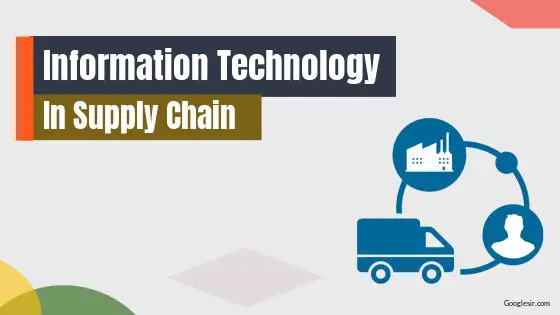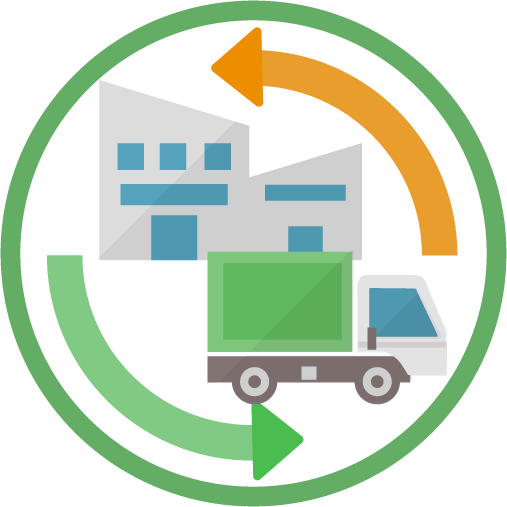The application of information technology to the process of planning and control of supply chain activities (including logistics activities) has grown rapidly with the introduction of microcomputers.

In modern management, information has become a central feature of management planning and control. Computers and information technology have been used to support logistics and supply chain management for many years.
Nowadays, information technology is viewed as a key factor that will affect the growth and development of logistics and supply chain management.
This section focuses on how information can make logistics and supply chain management decisions more effective, considers the role of information management in the development of supply chain strategy, and then discusses the issuers from an operational perspective.
Information Technology in Supply Chain or Logistics
The following are the reasons why information technology is important for the supply chain:
1. Effective Information Management
Effective information management can help ensure that a firm meets the logistical needs of its customers.
Firms need to place priorities on logistical elements such as on-time delivery, stockout levels, order status, shipment tracking and expediting, order convenience, order completeness, creation of customer pick up, and backhaul opportunities and product substitution.
The logistics managers are responsible for these activities and time and accurate flow of meaningful information enable them to successfully implement the same.
The logistics activities assist significantly in meeting customer needs and an accurate and relevant information system can facilitate the logistics mission.
Related: Different Functions of Transportation in Marketing and Sales.
2. Useful Combination of Software and Hardware
Logistics information systems combine hardware and software to manage, control, and measure logistics activities that occur within specific firms as well as across the overall supply chain.
Hardware includes computers and servers, internet technologies, ancillary technologies such as barcode and RF devices, communication channels, and storage media.
The software includes systems and application programs used for logistics and supply chain activities.
The ability to integrate and thus leverage the power of the technologies makes the firms more successful than other firms that do not have such abilities.
What are the Applications of Marketing Research?
3. Helps in Decisions Support Systems
Companies need better information on their customers (such as customer service and sales forecasting), information on their suppliers. (such as production planning and sourcing and purchasing).
Areas of technology systems including decision support systems/information technology and logistics management activities were not delivering needed information to the management for making strategic decisions.
4. Digital Order Processing System
The order processing system is the nerve center of the logistics and supply chain system.
A customer order provides the communication message to set the logistics process in motion.
The cost and efficiency of the entire communication can result in loss of customers or excessive transportation, inventory, and warehousing costs together with possible manufacturing inefficiencies caused by frequent changes in the production line.
The order processing and information systems form the foundation for logistics and corporate management information systems.
5. Computerization of Firm Activities
Leading-edge organizations are utilizing computers extensively to support logistics activities.
Computers are used in order entry, order processing, finished goods inventory control, performance measurement, freight audit/payment, and warehousing.
World-class logistics practices include the use of logistics information systems as a key to competitiveness.
Related: Importance of Marketing in the Modern World.
6. Competitive Advantages
Computer-based decision support systems (DSS) support the executive decision-making process in logistics and supply chain management.
To support time-based competition, firms are increasingly using information technologies as a source of competitive advantages.

Systems such as a quick response (QR) just in time (JIT) and efficient consumer response (ECR) are integrating a number of information-based technologies in an effort to reduce order cycle times, speed responsiveness, and lower supply chain inventory.
More sophisticated applications of information technology such as decision support systems, artificial intelligence and export systems are being used directly to support decision making in logistics and supply chain management.
5 logistics tips for small business.
7. Fast Connectivity through WEB
Today, companies are restructuring their businesses to function in the new era of electronic commerce.
Organizations can have a deluge of information on websites, business to business requirements, and online customer and supplier linkages.
ERP systems, purchasing databases and data warehouses, electronic data interchange (EDI, business to business electronic commerce are recent development which applied in logistics and supply chain management.
Conclusion
Many firms today effective management of logistics and supply chain activities as a prerequisite to the achievement of overall cost efficiency and as a key to ensuring their ability to price their products and services to meet and beat the competition.
The logistics competencies of a firm provide unique ways in which the firm is able to differentiate itself in the marketplace.
Information technology is being used by leading-edge firms to increase their competitiveness ad develop technologies that have been traditionally regarded as key strategic resources and expertise in these areas is now thought to be the most valuable and essential of all corporate resources.
Hence, there is a need for effective management of corporate information systems and technologies which are highly relevant and most important to logistics and supply chain management.
Recommended for You:

It’s amazing to know that IT services can also help a lot in inventory management. I’ve always wanted to have my own hobby store in the future since I used to play a lot of tabletop games back when I was in college. Turning my hobby into a business will definitely make me feel satisfied with life.